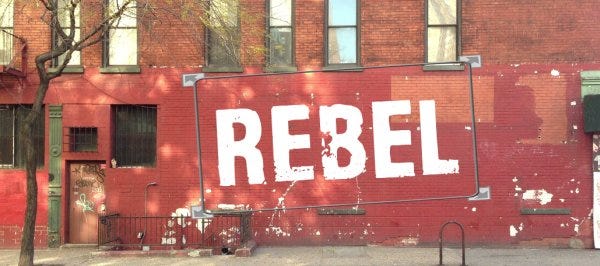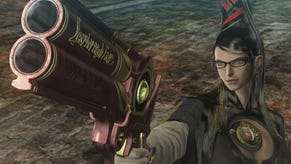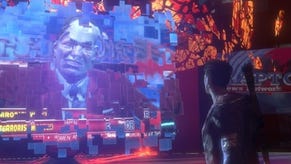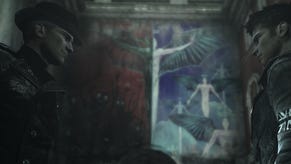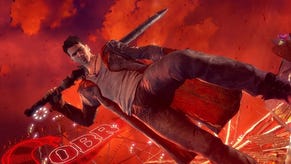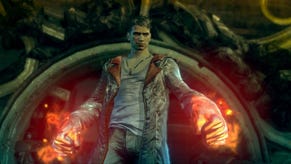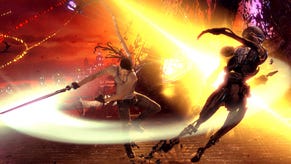Reimagining Evil: Ninja Theory On DmC's Cultural Satire
Deconstructing Dante
There was an unexpected element to DmC: Devil May Cry. It was always going to be about smashing up demons. It was always going to feature weapon-switching, combo-building, score-chasing, and combat tech-fests. What was possibly more of a surprise was it being an outlandish political satire which takes aim at consumer culture, finance and banking, surveillance society, and right-wing media. Ninja Theory's Dominic Matthews explains the role satire plays in DmC's cultural commentary on evil.
Dante’s nemesis, Mundus, isn’t just king of the demons. He’s a big shot banker, operating from the top of a twisted skyscraper, which might be at home in the financial districts of London, Frankfurt or New York. Revelling in the power he yields, he keeps the general population in debt. His allies are the likes of Bob Barbus, a manipulative Fox-News-alike news anchor who tries to frame Dante as a degenerate terrorist, and a foul mouthed succubus who squirts soft-drinks out of one end as obscenities flow from the other.
"We made the concept of rebellion — also the name of Dante’s sword — the heart of DmC," says Ninja Theory's Dominic Matthews. "Rebellion in its current form covers all these issues in modern day society. But more than that, we wanted to consider a different kind of evil in DmC, one that didn’t rely on the typical horned devil."
Matthews explains that bringing a new, contemporary direction to the series was always the brief from. “It was our mission to take Devil May Cry and take it in a completely fresh direction. Capcom said to us, ‘Think about Dante as if he were a character from a contemporary western movie.' They gave us a lot of creative freedom and support in the direction we wanted to take things. The challenge was to keep Dante, the spirit of Dante, and Devil May Cry, while bringing the themes, the look and attitude into the here and now. We were asked to reimagine the franchise. That also meant reimagining evil."
In the way that DmC deals with this new evil, it’s drawn a number of comparisons with John Carpenter’s They Live. In the classic film, the protagonist obtains what might be described as a pair of 'ideology sunglasses'. When wearing the sunglasses, the truth behind the banal advertisements, shop signs, and magazines which surround the protagonist are revealed, so that he is bombarded by messages commanding him to “obey”, “marry and reproduce”, and “consume”. DmC pulls the same trick, so it’s no surprise when Matthews confirms that They Live was indeed an influence.
When Dante is pulled into the demonic dimension of Limbo, the shift of perspective puts him in a world in which ideology becomes plain to see. Early on a sign that reads “Hot Food” becomes “Gluttony is good”. DmC adds its own twist to the formula by ramping the concept up a level or two. In Limbo, the environment itself becomes oppressive as it shifts and mutates to try and hinder your progress. You’re not just being told to obey, the world itself actively conspires to make you obey.
What you get from DmC then is not a narrative about demons tempting the innocent, torturing and tormenting souls, or using automated phone services to constantly bother you about Payment Protection Insurance. You get a story about a population controlled by powerful and corrupt financial institutions which hold sway over government. A story about a population with its senses dulled by an obsession with consumer culture and celebrity. About a population fed lies through a reactionary corporate media network which seeks to police the truth rather than reveal it. So, outlandish as it is, DmC’s world is a satirical interpretation of our own.
Ninja Theory have simply held it to a fun-house mirror, warping and accentuating its most disturbing features.
It's also anything but a po-faced critique of contemporary political and social institutions. The outrageously grotesque figures which Ninja Theory use to represent their chosen targets with all the subtlety of a sledgehammer make that perfectly clear. And that’s not a criticism. Sure, DmC’s brand of Hollywood Marxism isn’t what one might call sophisticated, but it’s not meant to be. Ninja Theory are being deliberately ostentatious, taking a pop at their targets in a playful way and maintaining a sense of awareness about the ridiculousness of their approach.
“Satire is a peculiarly British focus,” Matthews says. “From Spitting Image to Have I Got News for You, we don’t hold back in ridiculing the establishment and getting to the truth through humour. DmC is no different in that regard. It’s a comical satire on the world we live in. It shouldn’t be taken too seriously but it is a reflection of our times”.
It’s not just oppressive forces that are represented in DmC. There is also the revolutionary group, The Order, of which Dante becomes an ally in his quest to take down Mundus. Early on in the game, the group’s leader sends out a message wearing a mask clearly intended to reference the famous V mask adopted by groups such as Occupy and Anonymous. The way the group operates, communicating, organising, and hacking information using the internet, invites further comparisons to these groups, as well as the likes of Wikileaks. However, Matthews is reluctant to read DmC as taking a firm political stance on the status of these groups.
"We thought about what tools a small resistance group like the Order would use to fight back,” Matthews explains. “The themes presented shouldn’t be taken as Ninja Theory’s political stance or us trying to say one thing or another. We’re representing how we believe an organisation like The Order would operate in our world." Matthews prefers to describe DmC as a game dealing with “the universal theme” of “the need to rebel as a means to achieve freedom." He prefers to see the game in the linage of works like V for Vendetta, “a very good example of the viewer being [placed] on the side of social uprising and rebellion”.
Matthews does concede however that the power of the internet as depicted in DmC does reflect something important about its potential as a tool for social change in the real world. “The line between news reports and satire like Brass Eye has all but vanished,” Matthews continues. “The power of the internet is that it gives people around the world the means and voice to both create and smash disinformation."
Whether Ninja Theory genuinely didn’t intend for DmC to be read as a comment on groups like Occupy, Anonymous and Wikileaks or not, inferences to these groups are there to be read by the player. And as the game certainly does represent the internet as revolutionary tool, it's not difficult to draw connections to how it's used by Occupy, Wikileaks, et al. The negative depiction of The Order as terrorists and traitors by DmC’s right-wing media is precisely the way such groups are often framed by certain media outlets.
Regardless of how Ninja Theory intended this to be read, it’s refreshing to play a big budget game which plays with contemporary political themes, and which is prepared to take a progressive stance, even if it is coated in a layer of demonic silliness. Matthews agrees that broadening the scope of the themes videogames deal with is important for the growth of the medium.
“It seems that games are perceived to be for kids and should never tackle themes a Saturday morning cartoon wouldn’t. It would be pretty depressing and limiting if all developers accepted that as the status quo. Our games are being played by intelligent adults, so there is no reason why we can’t treat them as such."
